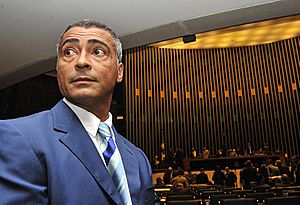Romário facts for kids
Quick facts for kids
Romário
|
|||||||||||||||||||||||||||||||||||||||||||||||||||||||||||||||||||||||||||||||||||||||||||||||||||||||||||||||||||||||||||||||||||||||||||||||||||||||||||||||||||||||||||||||
|---|---|---|---|---|---|---|---|---|---|---|---|---|---|---|---|---|---|---|---|---|---|---|---|---|---|---|---|---|---|---|---|---|---|---|---|---|---|---|---|---|---|---|---|---|---|---|---|---|---|---|---|---|---|---|---|---|---|---|---|---|---|---|---|---|---|---|---|---|---|---|---|---|---|---|---|---|---|---|---|---|---|---|---|---|---|---|---|---|---|---|---|---|---|---|---|---|---|---|---|---|---|---|---|---|---|---|---|---|---|---|---|---|---|---|---|---|---|---|---|---|---|---|---|---|---|---|---|---|---|---|---|---|---|---|---|---|---|---|---|---|---|---|---|---|---|---|---|---|---|---|---|---|---|---|---|---|---|---|---|---|---|---|---|---|---|---|---|---|---|---|---|---|---|---|---|
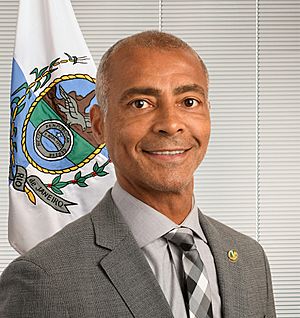
Official portrait, 2023
|
|||||||||||||||||||||||||||||||||||||||||||||||||||||||||||||||||||||||||||||||||||||||||||||||||||||||||||||||||||||||||||||||||||||||||||||||||||||||||||||||||||||||||||||||
| Senator for Rio de Janeiro | |||||||||||||||||||||||||||||||||||||||||||||||||||||||||||||||||||||||||||||||||||||||||||||||||||||||||||||||||||||||||||||||||||||||||||||||||||||||||||||||||||||||||||||||
| Assumed office 1 February 2015 |
|||||||||||||||||||||||||||||||||||||||||||||||||||||||||||||||||||||||||||||||||||||||||||||||||||||||||||||||||||||||||||||||||||||||||||||||||||||||||||||||||||||||||||||||
| Preceded by | Francisco Dornelles | ||||||||||||||||||||||||||||||||||||||||||||||||||||||||||||||||||||||||||||||||||||||||||||||||||||||||||||||||||||||||||||||||||||||||||||||||||||||||||||||||||||||||||||||
| Second Vice President of the Federal Senate | |||||||||||||||||||||||||||||||||||||||||||||||||||||||||||||||||||||||||||||||||||||||||||||||||||||||||||||||||||||||||||||||||||||||||||||||||||||||||||||||||||||||||||||||
| In office 1 February 2021 – 1 February 2023 |
|||||||||||||||||||||||||||||||||||||||||||||||||||||||||||||||||||||||||||||||||||||||||||||||||||||||||||||||||||||||||||||||||||||||||||||||||||||||||||||||||||||||||||||||
| President | Rodrigo Pacheco | ||||||||||||||||||||||||||||||||||||||||||||||||||||||||||||||||||||||||||||||||||||||||||||||||||||||||||||||||||||||||||||||||||||||||||||||||||||||||||||||||||||||||||||||
| Preceded by | Izalci Lucas | ||||||||||||||||||||||||||||||||||||||||||||||||||||||||||||||||||||||||||||||||||||||||||||||||||||||||||||||||||||||||||||||||||||||||||||||||||||||||||||||||||||||||||||||
| Succeeded by | Rodrigo Cunha | ||||||||||||||||||||||||||||||||||||||||||||||||||||||||||||||||||||||||||||||||||||||||||||||||||||||||||||||||||||||||||||||||||||||||||||||||||||||||||||||||||||||||||||||
| Member of the Chamber of Deputies | |||||||||||||||||||||||||||||||||||||||||||||||||||||||||||||||||||||||||||||||||||||||||||||||||||||||||||||||||||||||||||||||||||||||||||||||||||||||||||||||||||||||||||||||
| In office 1 February 2011 – 1 February 2015 |
|||||||||||||||||||||||||||||||||||||||||||||||||||||||||||||||||||||||||||||||||||||||||||||||||||||||||||||||||||||||||||||||||||||||||||||||||||||||||||||||||||||||||||||||
| Constituency | Rio de Janeiro | ||||||||||||||||||||||||||||||||||||||||||||||||||||||||||||||||||||||||||||||||||||||||||||||||||||||||||||||||||||||||||||||||||||||||||||||||||||||||||||||||||||||||||||||
| Personal details | |||||||||||||||||||||||||||||||||||||||||||||||||||||||||||||||||||||||||||||||||||||||||||||||||||||||||||||||||||||||||||||||||||||||||||||||||||||||||||||||||||||||||||||||
| Born | 29 January 1966 Rio de Janeiro, Brazil |
||||||||||||||||||||||||||||||||||||||||||||||||||||||||||||||||||||||||||||||||||||||||||||||||||||||||||||||||||||||||||||||||||||||||||||||||||||||||||||||||||||||||||||||
| Political party | PL (2021–present) | ||||||||||||||||||||||||||||||||||||||||||||||||||||||||||||||||||||||||||||||||||||||||||||||||||||||||||||||||||||||||||||||||||||||||||||||||||||||||||||||||||||||||||||||
| Other political affiliations |
|
||||||||||||||||||||||||||||||||||||||||||||||||||||||||||||||||||||||||||||||||||||||||||||||||||||||||||||||||||||||||||||||||||||||||||||||||||||||||||||||||||||||||||||||
| Height | 1.67 m (5 ft 6 in) | ||||||||||||||||||||||||||||||||||||||||||||||||||||||||||||||||||||||||||||||||||||||||||||||||||||||||||||||||||||||||||||||||||||||||||||||||||||||||||||||||||||||||||||||
| Spouses |
Mônica Santoro
(m. 1988; div. 1995)Danielle Favatto
(m. 1996; div. 2001)Isabelle Bittencourt
(m. 2002; div. 2014) |
||||||||||||||||||||||||||||||||||||||||||||||||||||||||||||||||||||||||||||||||||||||||||||||||||||||||||||||||||||||||||||||||||||||||||||||||||||||||||||||||||||||||||||||
| Children | 7, including Romarinho | ||||||||||||||||||||||||||||||||||||||||||||||||||||||||||||||||||||||||||||||||||||||||||||||||||||||||||||||||||||||||||||||||||||||||||||||||||||||||||||||||||||||||||||||
| Profession | Footballer, politician | ||||||||||||||||||||||||||||||||||||||||||||||||||||||||||||||||||||||||||||||||||||||||||||||||||||||||||||||||||||||||||||||||||||||||||||||||||||||||||||||||||||||||||||||
|
Association football career
|
|||||||||||||||||||||||||||||||||||||||||||||||||||||||||||||||||||||||||||||||||||||||||||||||||||||||||||||||||||||||||||||||||||||||||||||||||||||||||||||||||||||||||||||||
Romário de Souza Faria (born January 29, 1966), known simply as Romário, is a famous Brazilian politician and former professional footballer. He is currently a Senior Senator for Rio de Janeiro and the president of the football club America-RJ.
Romário was an amazing striker known for scoring many goals. He scored over 700 goals for his clubs and country. Many people think he is one of the greatest forwards of all time. He was a key player for Brazil when they won the 1994 FIFA World Cup. He even won the FIFA World Cup Golden Ball as the best player of that tournament. In the same year, he was named FIFA World Player of the Year.
He was also chosen for the FIFA World Cup Dream Team in 2002. In 2004, he was named in the FIFA 100 list, which features the world's greatest living players. Romário started his political career in 2010. He was elected as a deputy and later became a senator in 2014.
Contents
Playing for Clubs
Early Football Days
Romário grew up in humble beginnings. He was discovered playing for Olaria, a small club in Rio de Janeiro. He then joined the junior team of Vasco da Gama. There, he helped them win two state league titles in 1987 and 1988. His talent also earned him his first calls to play for the national team. He became well-known internationally after being the top scorer at the 1988 Olympic football tournament.
Success with PSV Eindhoven
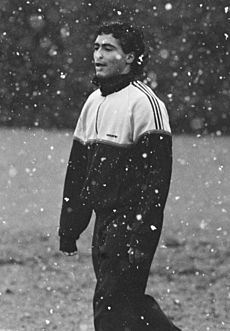
After the Olympics, Romário moved to PSV Eindhoven in the Netherlands in 1988. He helped PSV win the Eredivisie (Dutch league) three times: in 1989, 1991, and 1992. He was known for being great at scoring goals even in small spaces near the goal. Romário scored an amazing 165 goals in 167 games during his five seasons at PSV.
His coach at PSV, Guus Hiddink, once said that Romário was very confident. Romário would tell him, "Take it easy, coach, I'm going to score and we’re going to win." And often, he did!
Joining Barcelona's Dream Team
In 1993, Romário joined Barcelona for the 1993–94 season. He became a key part of Johan Cruyff's famous "Dream Team." He played alongside stars like Hristo Stoichkov, Michael Laudrup, and Ronald Koeman. He helped Barcelona win the La Liga title in his first season. He was also the top goalscorer in the league with 30 goals in 33 matches.
Barcelona also reached the 1994 UEFA Champions League final that year. One of Romário's best games was when he scored three goals in a 5–0 win against Real Madrid. He scored a spectacular opening goal by dribbling the ball around a defender and then kicking it into the net. He also scored against Manchester United in the UEFA Champions League.
Romário was named FIFA World Player of the Year in 1994. He left Barcelona in January 1995 after some disagreements with coach Cruyff.
Playing for Flamengo and Valencia
In 1995, Romário returned to Brazil to play for Flamengo. He stayed there for five years, with two short breaks to play in Spain. He briefly played for Valencia in Spain in 1996 and 1997. However, he had some arguments with the coach and was loaned back to Flamengo. He returned to Valencia for a short time in 1997 but soon went back to Flamengo.
Return to Vasco and Fluminense
Romário rejoined Vasco da Gama in 2000. He teamed up with another great striker, Edmundo. Together, they led Vasco to the final of the 2000 FIFA Club World Championship. Romário was the joint-top goalscorer in that tournament. They famously beat European champions Manchester United 3–1, with Romário scoring two goals.
At 34 years old, Romário had one of his best seasons. He won the Copa Mercosur and the Brazilian league title with Vasco. He was named the South American Footballer of the Year and Brazilian Footballer of the Year. He was also the Brazilian league's top goalscorer in 2000 and 2001.
From 2002 to 2004, he played for Fluminense. He also had a short time playing in Qatar for Al Sadd. In 2005, at 39 years old, Romário scored 22 goals in the Brazilian Championship. This made him the league's top goalscorer for the third time.
Later Career and Thousandth Goal
In 2006, Romário joined Miami FC in the United States. He helped them reach their first-ever playoffs, scoring 19 goals. He also played a few games for Adelaide United in Australia. In January 2007, he signed a new deal with Vasco da Gama.
On May 20, 2007, Romário scored what he claimed was his 1000th goal. It was a penalty kick for Vasco da Gama against Sport Recife. The game was stopped for over 20 minutes for celebrations! There is some discussion about whether all 1000 goals were in official games, as his count included youth and friendly matches. FIFA officially counts him with 929 goals. Vasco da Gama even put up a statue of Romário at their stadium, São Januário, to celebrate this milestone.
Romário briefly became an interim manager for Vasco in 2007. He even played in a match while also being the coach!
Retirement and Comebacks
Romário announced his retirement from playing and coaching in February 2008. He said his weight was a big reason for his decision. He officially retired from playing football on April 15, 2008. He had played for many clubs across five continents for over two decades. He scored 71 goals in 85 games for Brazil.
In August 2009, Romário decided to play again for America from Rio de Janeiro. He said he wanted to fulfill his late father's wishes. He played one game in November 2009, helping America win a championship.
In 2024, at 58 years old, Romário made another comeback! He registered as a player-president for America in the 2024 Campeonato Carioca Série A2. He planned to play alongside his son, Romarinho.
Playing for Brazil
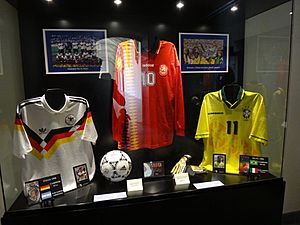
Romário was a key player for the Brazil national team. He won a silver Olympic medal in Seoul in 1988, being the top scorer with seven goals. He became a national hero in 1989 when he scored the only goal in the 1989 Copa América final against Uruguay. This win ended Brazil's long wait for a trophy. He played in the World Cups of 1990 and 1994. He scored 55 goals in 70 official international matches, making him the fourth-highest goalscorer in Brazil's history.
1990 World Cup Journey
Romário was a big star before the 1990 World Cup in Italy. However, he got a serious injury a few months before the tournament. Even though he recovered and was in the squad, he only played 66 minutes in one match. Brazil was knocked out early in the tournament.
Winning the 1994 World Cup
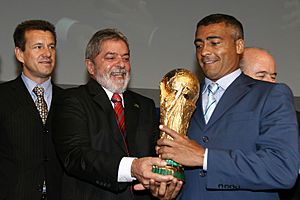
In 1992, Romário was left out of the national team by coach Carlos Alberto Parreira. This made many fans and journalists upset. Brazil struggled in the World Cup qualifiers. They needed to win or tie against Uruguay to qualify. Parreira finally called Romário back for this important match. Romário famously said, "I already know what is going to happen: I'm going to finish Uruguay." Brazil won 2–0, with Romário scoring both goals, and qualified for the World Cup!
At the 1994 FIFA World Cup in the United States, Romário played with Bebeto in attack. They led Brazil to win their fourth World Cup title. Romário scored five goals in the tournament. He scored in each of the first three group matches. He also scored against the Netherlands in the quarterfinals and the winning goal against Sweden in the semifinals.
In the final against Italy, the game ended in a 0–0 draw. Romário scored Brazil's second penalty in the shootout, which Brazil won 3–2. He won the FIFA World Cup Golden Ball as the best player of the tournament. He was also named to the FIFA World Cup All-Star Team.
Romário and Bebeto also created one of the most famous goal celebrations. After Bebeto scored against the Netherlands, he started rocking an imaginary baby. Romário and Mazinho joined him, rocking along.
The Ro-Ro Attack
After the 1994 World Cup, Romário formed a powerful attacking duo with Ronaldo. They were called the Ro-Ro duo. They won the 1997 Copa América together, scoring eight goals between them. In December 1997, they both scored three goals each in a 6–0 win against Australia in the 1997 FIFA Confederations Cup final. Romário was the top scorer in that tournament with seven goals.
Missing World Cups
Romário was left out of the 1998 FIFA World Cup squad due to a muscular injury. He tried hard to recover but wasn't fully fit. Brazil lost the final to France that year.
Before the 2002 FIFA World Cup, Romário was playing very well for Vasco da Gama. However, coach Luiz Felipe Scolari decided not to pick him for the national team. This was due to some past issues with discipline. Without Romário, Brazil went on to win the World Cup for the fifth time.
Final Game for Brazil
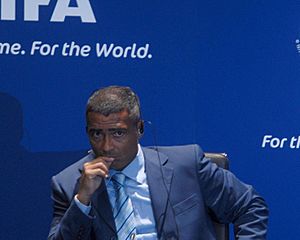
On April 27, 2005, Romário played his last game for the Brazil national team. It was a friendly match where he wore the captain's armband. He scored the second goal in Brazil's 3–0 win against Guatemala. After his playing career with Brazil ended, Romário helped campaign for Brazil to host the 2014 FIFA World Cup.
Other Sports: Footvolley and Beach Soccer
Romário has always loved footvolley, a sport that combines football and volleyball. He has played in many tournaments. In 2006, he won a footvolley tournament in Miami Beach, USA. He was also runner-up in the 2011 Footvolley World Championship. He also plays Beach soccer and represented Brazil at the 2005 FIFA Beach Soccer World Cup.
How Romário Played
Romário is considered one of the greatest and most successful strikers ever. His coach at Barcelona, Johan Cruyff, called him a "genius of the goal area." Ronaldo, who played with him, said Romário was the most important player he ever played with. He learned a lot from Romário's goal-scoring skills.
Romário was nicknamed Baixinho, which means "The Little One" or "Shorty" in Portuguese. He was very agile and had great balance. Even though he was small, he was strong, which helped him in tight spaces. He was known for his quick speed over short distances and his ability to trick defenders. He scored many different types of goals, often with a quick "toe-poke" shot. He was also good at dribbling and using fancy moves to get past players.
Romário was known for being in the right place at the right time to score goals. He was smart about finding open space in the penalty area. Besides scoring, he was also fast and creative, often setting up goals for his teammates. He formed great partnerships with other talented forwards like Stoichkov, Edmundo, and Bebeto.
Media and Endorsements
Romário has appeared in commercials for the sportswear company Nike. In 1998, he was in a Nike commercial set in an airport with other famous Brazilian players like Ronaldo and Roberto Carlos. He is also featured in EA Sports' FIFA video game series.
Political Career
In 2010, Romário was elected to the Chamber of Deputies as part of the Brazilian Socialist Party. He was one of the most voted candidates in Rio de Janeiro.
He spoke out against corruption related to the 2014 FIFA World Cup in Brazil. He was elected as a senator in 2014, receiving the most votes ever for a candidate from Rio de Janeiro state.
In 2017, Romário joined a new political party called Podemos. He became the president of the party in Rio de Janeiro. In 2018, he ran for governor of Rio de Janeiro but finished in fourth place. In 2021, he joined the Liberal Party.
Personal Life
Romário has seven children, including his son Romarinho, who is also a footballer. Romarinho also played for Vasco da Gama.
Career Statistics
Club
| Season | Club | League | Regional league | Cup | Continental | Other | Total | |||||||
|---|---|---|---|---|---|---|---|---|---|---|---|---|---|---|
| Division | Apps | Goals | Apps | Goals | Apps | Goals | Apps | Goals | Apps | Goals | Apps | Goals | ||
| Vasco da Gama | 1985 | Série A | 7 | 0 | 21 | 11 | — | 0 | 0 | — | 28 | 11 | ||
| 1986 | Série A | 23 | 9 | 25 | 20 | — | — | — | 48 | 29 | ||||
| 1987 | Série A | 17 | 8 | 24 | 16 | — | — | — | 41 | 24 | ||||
| 1988 | Série A | 0 | 0 | 24 | 16 | — | — | — | 24 | 16 | ||||
| Total | 47 | 17 | 94 | 63 | — | — | — | 141 | 80 | |||||
| PSV | 1988–89 | Eredivisie | 24 | 19 | — | 5 | 4 | 2 | 2 | 3 | 1 | 34 | 26 | |
| 1989–90 | Eredivisie | 20 | 23 | — | 3 | 2 | 4 | 6 | — | 27 | 31 | |||
| 1990–91 | Eredivisie | 25 | 25 | — | 3 | 5 | 2 | 0 | — | 30 | 30 | |||
| 1991–92 | Eredivisie | 15 | 9 | — | 1 | 0 | 2 | 0 | 1 | 0 | 19 | 9 | ||
| 1992–93 | Eredivisie | 26 | 22 | — | 3 | 3 | 9 | 7 | 1 | 0 | 39 | 32 | ||
| Total | 110 | 98 | — | 15 | 14 | 19 | 15 | 5 | 1 | 149 | 128 | |||
| Barcelona | 1993–94 | La Liga | 33 | 30 | — | 2 | 0 | 10 | 2 | 2 | 0 | 47 | 32 | |
| 1994–95 | La Liga | 13 | 4 | — | 0 | 0 | 5 | 3 | — | 18 | 7 | |||
| Total | 46 | 34 | — | 2 | 0 | 15 | 5 | 2 | 0 | 65 | 39 | |||
| Flamengo | 1995 | Série A | 16 | 8 | 21 | 26 | 5 | 1 | 4 | 2 | — | 46 | 37 | |
| 1996 | Série A | 3 | 0 | 19 | 26 | 5 | 1 | 0 | 0 | 6 | 4 | 33 | 31 | |
| Total | 19 | 8 | 40 | 52 | 10 | 2 | 4 | 2 | 6 | 4 | 79 | 68 | ||
| Valencia | 1996–97 | La Liga | 5 | 4 | — | 0 | 0 | 0 | 0 | — | 5 | 4 | ||
| 1997–98 | La Liga | 6 | 1 | — | 1 | 1 | — | — | 7 | 2 | ||||
| Total | 11 | 5 | — | 1 | 1 | 0 | 0 | — | 12 | 6 | ||||
| Flamengo | 1997 | Série A | 4 | 3 | 18 | 18 | 8 | 7 | 0 | 0 | 6 | 7 | 36 | 35 |
| 1998 | Série A | 20 | 14 | 11 | 10 | 4 | 6 | 3 | 4 | 2 | 1 | 40 | 35 | |
| 1999 | Série A | 19 | 12 | 15 | 16 | 7 | 7 | 7 | 8 | 6 | 3 | 54 | 46 | |
| Total | 43 | 29 | 44 | 44 | 19 | 20 | 10 | 12 | 14 | 11 | 130 | 116 | ||
| Vasco da Gama | 2000 | Série A | 28 | 20 | 17 | 19 | 2 | 1 | 14 | 14 | 10 | 12 | 71 | 66 |
| 2001 | Série A | 18 | 21 | 6 | 11 | 0 | 0 | 9 | 5 | 6 | 3 | 39 | 40 | |
| 2002 | Série A | 0 | 0 | 4 | 8 | 7 | 5 | — | 14 | 13 | 25 | 26 | ||
| Total | 46 | 41 | 27 | 38 | 9 | 6 | 18 | 16 | 35 | 31 | 135 | 132 | ||
| Fluminense | 2002 | Série A | 26 | 16 | 0 | 0 | 0 | 0 | — | — | 26 | 16 | ||
| 2003 | Série A | 21 | 13 | 4 | 5 | 0 | 0 | 0 | 0 | — | 25 | 18 | ||
| 2004 | Série A | 13 | 5 | 9 | 6 | 2 | 2 | — | — | 24 | 13 | |||
| Total | 60 | 34 | 13 | 11 | 2 | 2 | — | — | 75 | 47 | ||||
| Al-Sadd (loan) | 2002–03 | Qatar Stars League | 3 | 0 | — | 0 | 0 | — | — | 3 | 0 | |||
| Vasco da Gama | 2005 | Série A | 30 | 22 | 10 | 7 | 3 | 1 | — | — | 43 | 30 | ||
| 2006 | Série A | 0 | 0 | 10 | 6 | 1 | 3 | 0 | 0 | — | 11 | 9 | ||
| Total | 30 | 22 | 20 | 13 | 4 | 4 | — | — | 54 | 39 | ||||
| Miami FC | 2006 | USL 1st | 25 | 19 | — | 1 | 0 | — | — | 26 | 19 | |||
| Adelaide United | 2006–07 | A-League | 4 | 1 | — | — | 0 | 0 | — | 4 | 1 | |||
| Vasco da Gama | 2007 | Série A | 6 | 3 | 9 | 10 | 3 | 2 | 1 | 0 | — | 19 | 15 | |
| America-RJ | 2009 | Carioca Série B | — | 1 | 0 | — | — | — | 1 | 0 | ||||
| Career total | 450 | 311 | 248 | 231 | 66 | 51 | 67 | 50 | 62 | 47 | 893 | 690 | ||
International
| National team | Year | Apps | Goals |
|---|---|---|---|
| Brazil | 1987 | 6 | 4 |
| 1988 | 7 | 2 | |
| 1989 | 11 | 4 | |
| 1990 | 1 | 0 | |
| 1991 | 0 | 0 | |
| 1992 | 2 | 0 | |
| 1993 | 1 | 2 | |
| 1994 | 10 | 10 | |
| 1995 | 0 | 0 | |
| 1996 | 0 | 0 | |
| 1997 | 17 | 19 | |
| 1998 | 7 | 3 | |
| 1999 | 0 | 0 | |
| 2000 | 2 | 7 | |
| 2001 | 5 | 3 | |
| 2002 | 0 | 0 | |
| 2003 | 0 | 0 | |
| 2004 | 0 | 0 | |
| 2005 | 1 | 1 | |
| Total | 70 | 55 | |
List of international goals scored by Romário
- Scores and results list Brazil's goal tally first, score column indicates score after each Romário goal.
| No. | Date | Venue | Opponent | Score | Result | Competition | Ref. |
|---|---|---|---|---|---|---|---|
| 1 | 28 May 1987 | Helsinki Olympic Stadium, Helsinki, Finland | 1–1 | 3–2 | Friendly | ||
| 2 | 1 June 1987 | Ramat Gan Stadium, Ramat Gan, Israel | 1–0 | 4–0 | Friendly | ||
| 3 | 3–0 | ||||||
| 4 | 28 June 1987 | Estadio Olímpico Chateau Carreras, Córdoba, Argentina | 5–0 | 5–0 | 1987 Copa América | ||
| 5 | 7 July 1988 | Olympic Park Stadium, Melbourne, Australia | 1–0 | 1–0 | Australia Bicentenary Gold Cup | ||
| 6 | 17 July 1988 | Sydney Football Stadium, Sydney, Australia | 1–0 | 2–0 | Australia Bicentenary Gold Cup | ||
| 7 | 12 July 1989 | Estádio do Maracanã, Rio de Janeiro, Brazil | 2–0 | 2–0 | 1989 Copa América | ||
| 8 | 14 July 1989 | Estádio do Maracanã, Rio de Janeiro, Brazil | 3–0 | 3–0 | 1989 Copa América | ||
| 9 | 16 July 1989 | Estádio do Maracanã, Rio de Janeiro, Brazil | 1–0 | 1–0 | 1989 Copa América | ||
| 10 | 30 July 1989 | Estadio Brígido Iriarte, Caracas, Venezuela | 2–0 | 4–0 | 1990 World Cup qualifier | ||
| 11 | 19 September 1993 | Estádio do Maracanã, Rio de Janeiro, Brazil | 1–0 | 2–0 | 1994 World Cup qualifier | ||
| 12 | 2–0 | ||||||
| 13 | 5 June 1994 | Commonwealth Stadium, Edmonton, Canada | 1–0 | 1–1 | Friendly | ||
| 14 | 8 June 1994 | Jack Murphy Stadium, San Diego, United States | 1–0 | 8–2 | Friendly | ||
| 15 | 2–0 | ||||||
| 16 | 5–1 | ||||||
| 17 | 12 June 1994 | Bulldog Stadium, Fresno, United States | 1–0 | 4–0 | Friendly | ||
| 18 | 20 June 1994 | Stanford Stadium, Stanford, United States | 1–0 | 2–0 | 1994 FIFA World Cup | ||
| 19 | 24 June 1994 | Stanford Stadium, Stanford, United States | 1–0 | 3–0 | 1994 FIFA World Cup | ||
| 20 | 28 June 1994 | Pontiac Silverdome, Pontiac, United States | 1–1 | 1–1 | 1994 FIFA World Cup | ||
| 21 | 9 July 1994 | Cotton Bowl, Dallas, United States | 1–0 | 3–2 | 1994 FIFA World Cup | ||
| 22 | 13 July 1994 | Rose Bowl, Pasadena, United States | 1–0 | 1–0 | 1994 FIFA World Cup | ||
| 23 | 2 April 1997 | Estádio Nacional Mané Garrincha, Brasília, Brazil | 1–0 | 4–0 | Friendly | ||
| 24 | 3–0 | ||||||
| 25 | 30 April 1997 | Orange Bowl, Miami, United States | 2–0 | 4–0 | Friendly | ||
| 26 | 3–0 | ||||||
| 27 | 4–0 | ||||||
| 28 | 31 May 1997 | Ullevaal Stadion, Oslo, Norway | 1–1 | 2–4 | Friendly | ||
| 29 | 8 June 1997 | Stade de Gerland, Lyon, France | 3–3 | 3–3 | Tournoi de France | ||
| 30 | 10 June 1997 | Parc des Princes, Paris, France | 1–0 | 1–0 | Tournoi de France | ||
| 31 | 13 June 1997 | Estadio Ramón Aguilera, Santa Cruz, Bolivia | 5–0 | 5–0 | 1997 Copa América | ||
| 32 | 26 June 1997 | Estadio Ramón Aguilera, Santa Cruz, Bolivia | 3–0 | 7–0 | 1997 Copa América | ||
| 33 | 5–0 | ||||||
| 34 | 7 December 1997 | Ellis Park Stadium, Johannesburg, South Africa | 1–0 | 2–1 | Friendly | ||
| 35 | 12 December 1997 | King Fahd II Stadium, Riyadh, Saudi Arabia | 2–0 | 3–0 | 1997 FIFA Confederations Cup | ||
| 36 | 3–0 | ||||||
| 37 | 16 December 1997 | King Fahd II Stadium, Riyadh, Saudi Arabia | 1–0 | 3–2 | 1997 FIFA Confederations Cup | ||
| 38 | 19 December 1997 | King Fahd II Stadium, Riyadh, Saudi Arabia | 1–0 | 2–0 | 1997 FIFA Confederations Cup | ||
| 39 | 21 December 1997 | King Fahd II Stadium, Riyadh, Saudi Arabia | 3–0 | 6–0 | 1997 FIFA Confederations Cup | ||
| 40 | 4–0 | ||||||
| 41 | 6–0 | ||||||
| 42 | 5 February 1998 | Orange Bowl, Miami, United States | 1–1 | 1–1 | 1998 CONCACAF Gold Cup | ||
| 43 | 8 February 1998 | Los Angeles Memorial Coliseum, Los Angeles, United States | 2–0 | 4–0 | 1998 CONCACAF Gold Cup | ||
| 44 | 15 February 1998 | 1–0 | 1–0 | 1998 CONCACAF Gold Cup | |||
| 45 | 3 September 2000 | Estádio do Maracanã, Rio de Janeiro, Brazil | 1–0 | 5–0 | 2002 FIFA World Cup qualification | ||
| 46 | 3–0 | ||||||
| 47 | 4–0 | ||||||
| 48 | 8 October 2000 | Estadio Jose Pachencho Romero, Maracaibo, Venezuela | 3–0 | 6–0 | 2002 FIFA World Cup qualification | ||
| 49 | 4–0 | ||||||
| 50 | 5–0 | ||||||
| 51 | 6–0 | ||||||
| 52 | 7 March 2001 | Estadio Jalisco, Guadalajara, Mexico | 2–2 | 3–3 | Friendly | ||
| 53 | 3–3 | ||||||
| 54 | 25 April 2001 | Estádio do Morumbi, São Paulo, Brazil | 1–1 | 1–1 | 2002 World Cup qualifier | ||
| 55 | 27 April 2005 | Estádio do Pacaembu, São Paulo, Brazil | 2–0 | 3–0 | Friendly |
Honours and Awards
|
Vasco da Gama
PSV Eindhoven
Barcelona
Flamengo
Al-Sadd
América-RJ
Brazil Youth Teams
Brazil National Team
|
Individual Awards
|
See also
 In Spanish: Romário para niños
In Spanish: Romário para niños
- List of men's footballers with 500 or more goals
 | James Van Der Zee |
 | Alma Thomas |
 | Ellis Wilson |
 | Margaret Taylor-Burroughs |


